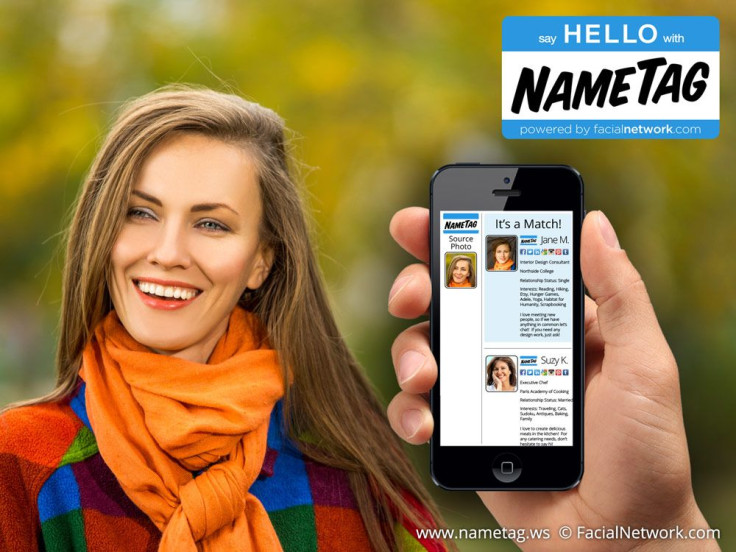NameTag: Facial Recognition App Checks If Your Date Is A Sex Offender But Should You Use It?

NameTag is a new facial recognition app that lets users match a face to their online and public record. The app scans a face and pulls up social media profiles but can also browse through 45,000 entries in the National Sex Offender Registry.
The app, developed by FacialNetwork.com, is available for iOS and Android devices and will soon be available for Google Glass. According to the press release, NameTag will soon be able to scan a face and compare it with dating profiles from OKCupid.com, Match.com and PlentyofFish.com.
For Kevin Alan Tussy, NameTag’s creator, the app was developed for safety. The app has the added benefit of giving users an easy way to learn more about their date, creating an instant connection based on mutual interest or hobbies. Tussy said in a statement, “It’s much easier to meet interesting new people when we can simply look at someone, see their Facebook, review their LinkedIn page or maybe even see their dating site profile. Often we were interacting with people blindly or not interacting at all.”
The issue of facial recognition has led to some fears over the invasion of privacy, especially with Google Glass. Tussy believes this can be addressed by having individuals sign up and create profiles on NameTag and choosing to not have their profile shown in public searches. “It’s not about invading anyone’s privacy; it’s about connecting people that want to be connected. We will even allow users to have one profile that is seen during business hours and another that is only seen in social situations,” said Tussy.
NameTag lets users compare online profiles based on facial recognition by pasting an image’s URL, uploading an existing photo from your phone or using the smartphone to scan the individual’s face. The app then compares data points with face in its database to create a summary of their online identity.
Kieran Mccartan, an associate professor in criminology at the University of the West of England, questioned whether or not NameTag’s ability to access sex offender registries is a good thing. Sex offender lists are publicly accessible but Mccartan cites a study that concludes public sex offender registries do not increase public safety.
Mccartan also questions if NameTag, and future apps of a similar ilk, will harm social relationships. In his article for the Conversation, Mccartan writes, “The notion that you can check whether a new partner has offending history suggests a less trusting and more suspicious approach to relationships, as well as an attempt to foresee and future-proof any potential problems.”
Questions about database maintenance, accuracy and reliability are also a concern for apps like NameTag. Instead of relying on an app, Mccartan argues people should ask their date those pressing questions and base their future on those answers.
The Boyfriend Tracker app also led to plenty of discussion about the invasion of privacy when it was released in Brazil in 2013. The app lets users obtain call histories, text messages and location via GPS when downloaded onto the boyfriend’s phone, with their permission says the app’s creator, Matheus Grijo.
A video of the Google Glass Beta of NameTag, courtesy of FacialNetwork.com, can be viewed below.
© Copyright IBTimes 2025. All rights reserved.




















